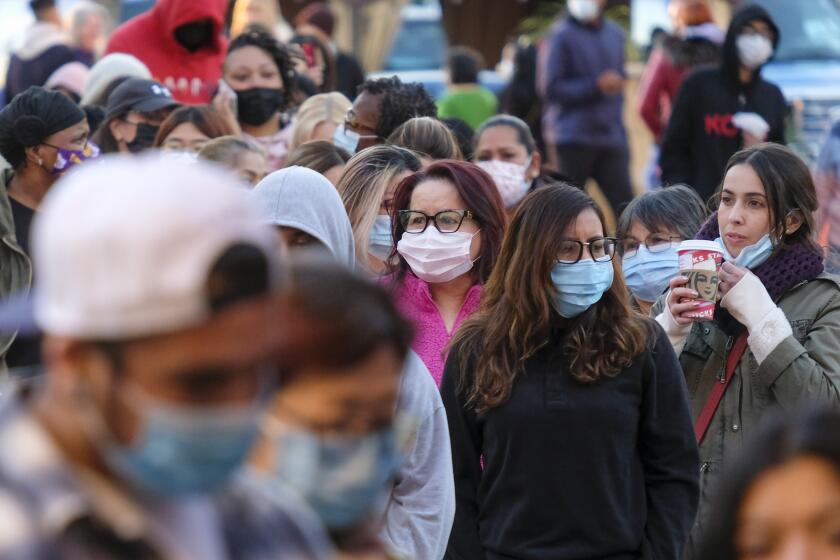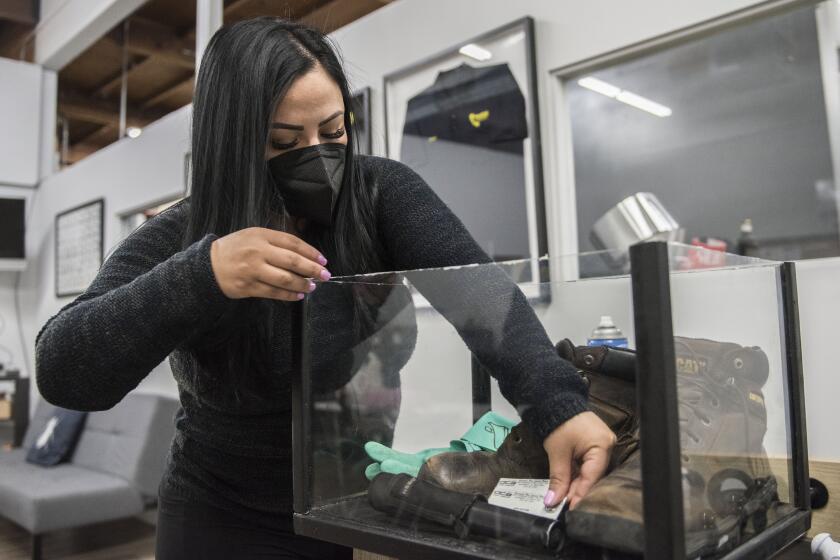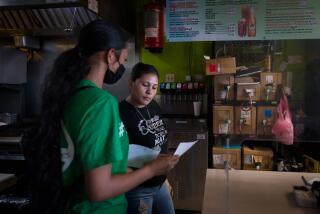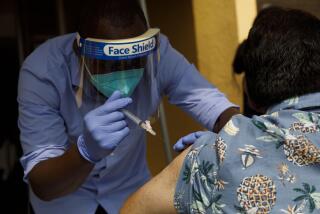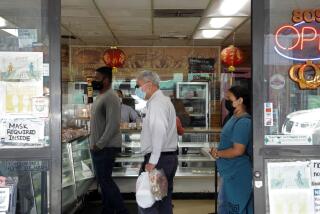Remembering ‘hope’: First Californian vaccinated against COVID reflects on a year gone by
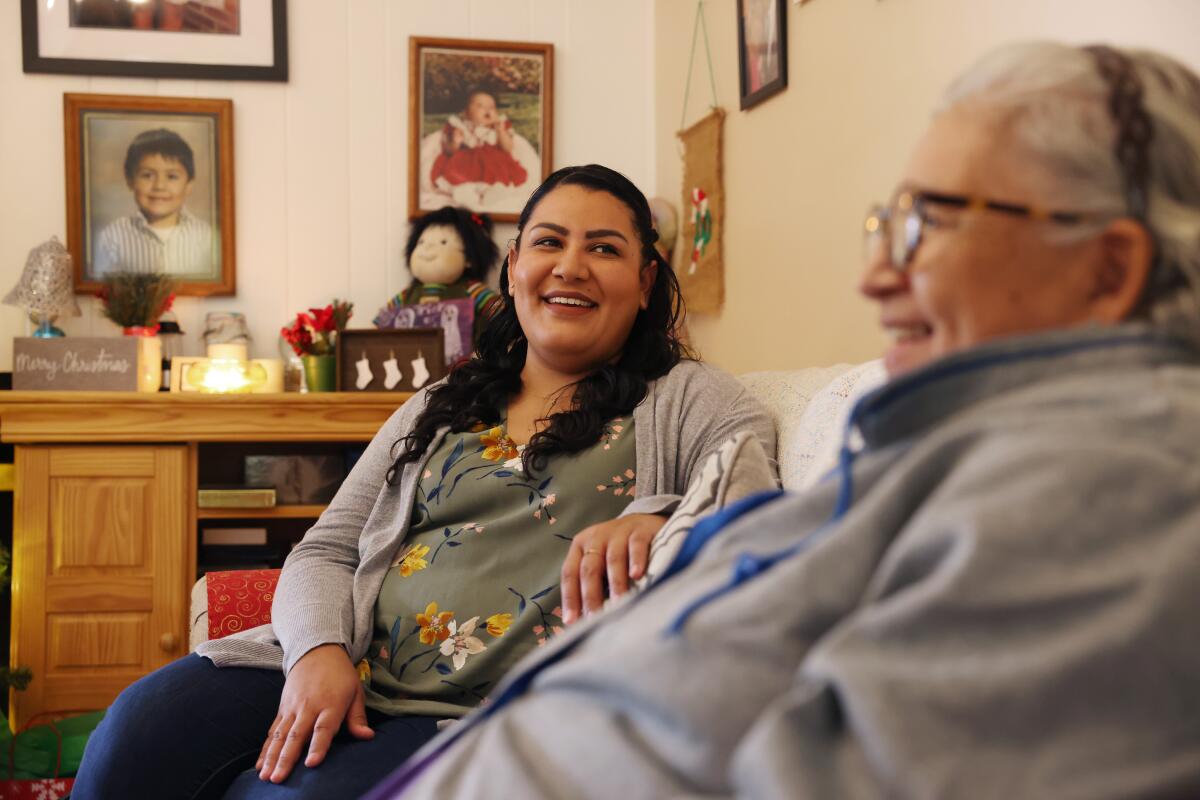
- Share via
Helen Cordova has celebrated two COVID-19 vaccinations in her family this month.
Her mother got a booster on her 66th birthday, then headed to a boisterous family dinner at Chili’s, something that wasn’t possible last winter when both indoor and outdoor dining were banned.
A few days later, Cordova’s newly eligible 5-year-old niece got her first dose after being promised a lollipop.
Those shots — among more than 62 million doses of the COVID-19 vaccine that have now been administered in California — were so easy to get that they were practically mundane.
How things have changed since Cordova, a 33-year-old nurse practitioner from the San Fernando Valley, got her own Pfizer-BioNTech vaccine.
A year ago this month, Cordova became the first person in California outside a clinical trial to get a COVID-19 vaccination, making history at a time when the virus was overwhelming hospitals and the first precious doses were limited to those most at risk: older people and front-line healthcare workers.
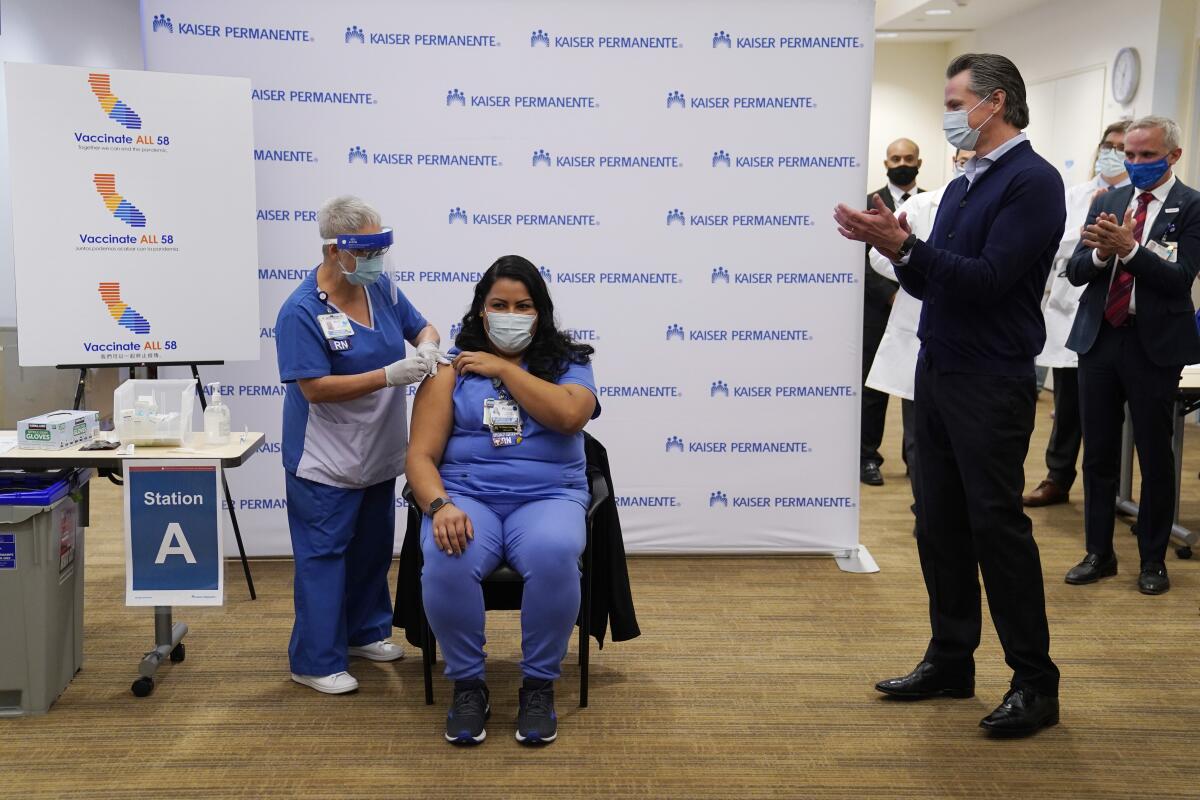
“I remember that hope I felt when I got the vaccine because it was probably the darkest period of the pandemic,” said Cordova, who treated COVID patients in the intensive care unit at Kaiser Permanente Los Angeles Medical Center at the time.
The day the first shots in the United States were administered — Dec. 14, 2020 — marked a hopeful new chapter in the pandemic.
Ballparks and fairgrounds were quickly converted to mass vaccination clinics. Infections and deaths plummeted for months as the highly effective inoculations became widely available. Business restrictions and mask mandates lifted. Schools reopened.
But the vaccine anniversary is bittersweet.
This month, the U.S. death toll from the coronavirus topped 800,000. Cases and hospitalizations are rising again because of the Delta and Omicron variants. Vaccinations, hampered by political divisiveness and rampant misinformation, have stalled.
Over the last year, “there have been some tremendous successes, not the least of which is the fact that these vaccines are universally available in the U.S.,” said UCLA epidemiologist Dr. Timothy Brewer. “We went from identifying a new pathogen to a vaccine in under a year. That would have been unheard of even five years ago.”
But “one of the big tragedies of the COVID-19 pandemic in the U.S.,” he said, is the politicization of masks and vaccines that hastened too much preventable sickness and death.
In California, 67% of the population is fully vaccinated. Millions of people who are eligible for the shot have not received a single dose — and they are, increasingly, hardliners who say they never will.
But it is important to acknowledge how far things have come, Los Angeles County Public Health Director Barbara Ferrer said in an interview. In L.A. County alone, more than 16 million doses have been administered, according to The Times’ vaccine tracker. That’s a number Ferrer called staggering and the result of a “herculean effort.”
“We had so much scarcity at the beginning; people were waiting months for their doses,” she said. “Now, you come to a site, you don’t have to wait to get vaccinated.
California is ordering a statewide mask mandate for indoor public spaces to go into effect on Wednesday.
“I feel like we were very hopeful last December, and we’re very hopeful this December. We know these vaccines are super powerful, even with the threat of Omicron ... [and] we owe a lot of credit to the bravery of those initial people.”
Cordova got the vaccine in front of news cameras, with Gov. Gavin Newsom standing beside her in a surgical mask.
At first, she didn’t even want the shot, fearing it was developed too quickly.
“I was like, that is too fast. I don’t trust it. How are we going to know what it’s going to do? Others can go ahead, and I’ll watch,” Cordova recalled.
She changed her mind after talking with colleagues and reading data from the vaccines’ clinical trials. And after she considered the hell she had witnessed in the COVID intensive care unit.
In March 2020, Cordova was working at Kaiser while juggling her final semester at UCLA, where she was studying to become a nurse practitioner.
At the start of each shift, she and her colleagues would gather in a conference room and get their patient assignments. One day, she and a few other nurses were held back as others left. They were told they would be working in the new COVID unit.
“I just remember feeling a bit of shock, then just nerves, and uneasiness because we didn’t know anything about the virus. Zero,” she said.
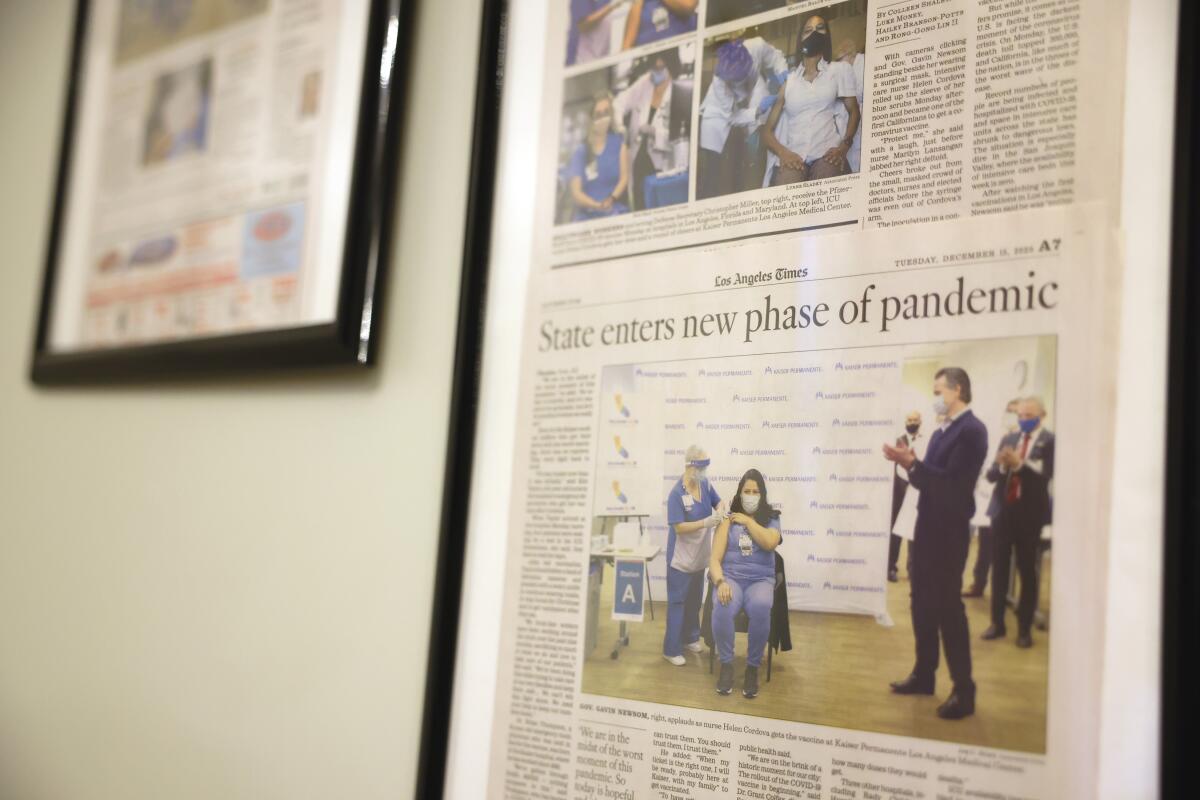
Cordova texted her mother and her two older brothers. Pray for me, she asked, before being led to the unit, which was locked and had security guards.
She’ll never forget her first patient: a middle-aged Latina with a cough, who was terrified as Cordova walked up to her wearing head-to-toe protective gear.
The woman relaxed when Cordova started speaking to her in Spanish. The patient had been tested for the coronavirus, but that’s when test kits were new, slow and scarce. She spent several days in the unit — with another patient on a ventilator in the next room — before learning she was negative.
It took a toll on Cordova, the daughter of Salvadoran immigrants, seeing the COVID unit filled with Latinos, who have been infected and have died from the virus at disproportionately high rates.
“It was heartbreaking because there’s so much distrust with the healthcare system,” she said. “Sometimes, in a pod of eight patient beds, seven were Latino.”
Cordova said she was one of just three certified Spanish-language translators on staff in the ICU. She would be called in constantly to tell a dying patient they should call their family before being intubated. She “held many an iPad” for the final “I love you” and “I’m praying for you.”
“I probably have some unprocessed PTSD from this,” she said. “It’s hard to talk about.”
In California, younger Latinos are dying of COVID-19 at much higher rates than their white and Asian counterparts.
In getting the COVID-19 vaccine, Cordova wanted to set an example for those patients. And for her family.
Cordova lives with her mother, Betty, in the Winnetka house where she grew up. She was terrified of infecting her.
For months, Cordova showered before leaving the hospital, then again at home. She had two rotating pairs of work shoes that she left outside, drenching them in bleach after every shift. She stayed far from her mother.
Any time her mom had a sniffle, she panicked. And felt guilty.
“I signed up to be a nurse,” she said. “That was my choice. I didn’t sign her up to be exposed to this. I saw so many people in the hospital, and many who were otherwise healthy, struggling to breathe, and the deck of cards was stacked against my mom should she get it.”
In 2001, Betty had extremely high blood pressure, and doctors discovered a thoracic aortic aneurysm. She was told to carry her chest X-rays wherever she went in the weeks before she could have surgery, in case it ruptured and emergency workers needed to know what happened.
Cordova was a 13-year-old middle-schooler at the time. If Betty was a little late picking her up, Cordova worried she had died.
Betty had surgery, a stroke in the hospital, and more surgery after a second aneurysm was found years later. It was because of her mom’s health issues that Cordova became a nurse.
On Dec. 13, 2020, Cordova was finishing a shift when her manager called and asked how she felt about the vaccine. She said she had finally decided: She was going to get it.
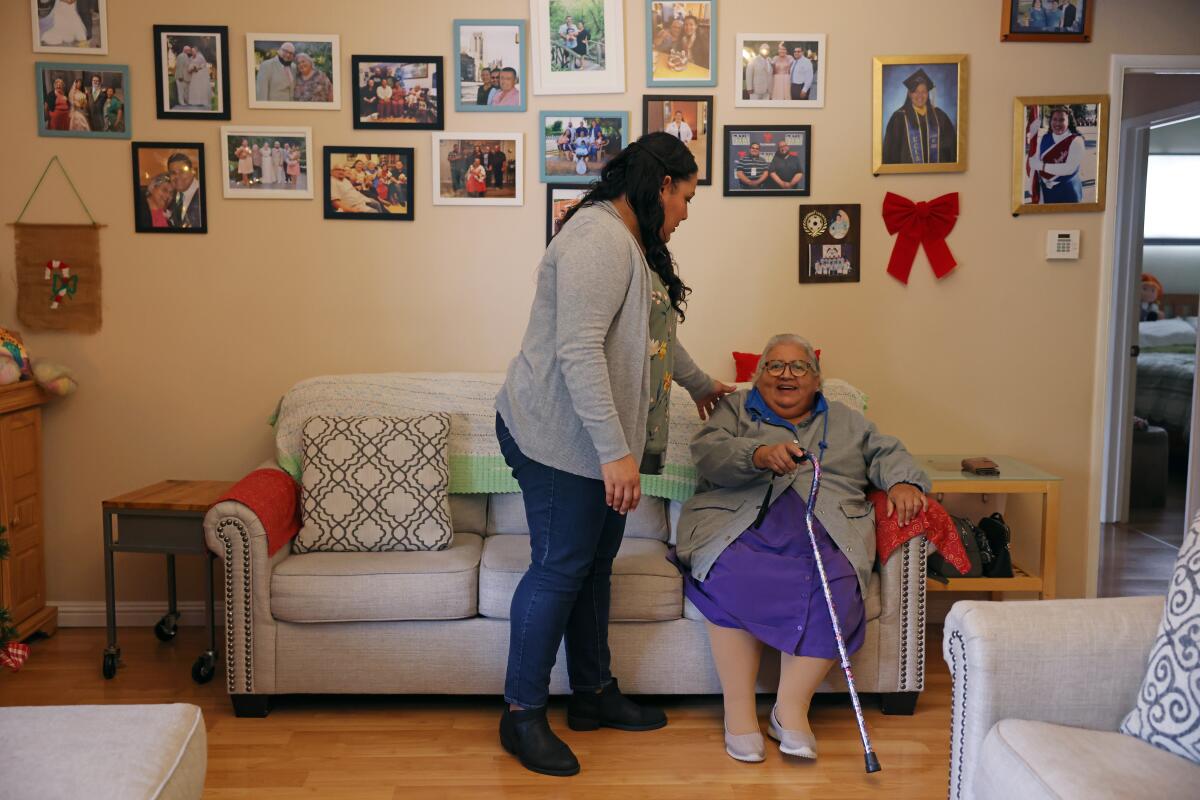
“OK, so what are you doing tomorrow?” she recalled him asking.
He told her the hospital had gotten some of the first doses and that she could get one because she had helped open the COVID ward. There might be some Kaiser internal media there, he said, but nothing too big.
She said yes. But her nerves had set in by the time she got home and told her mom.
“At first, I was very nervous, very scared,” Betty Cordova said. She worried what would happen to her daughter’s body. But at the same time, she said, she was “filled with hope and relief,” knowing there was finally something to combat the virus.
Cordova texted her brothers and said she was getting the vaccine the next day. Pray for me, she asked once again.
She stayed up all night texting friends, asking if she made the right choice.
Cordova woke up early and read the Pfizer studies again. Before she left, Betty told her she had decided that she, too, would get the vaccine when her time came.
When she got to work, someone told her that her vaccination would be a bit bigger event than they realized. L.A. Mayor Eric Garcetti would be there. And Newsom. And every news outlet in the region.
Oh, they added, and she would be the first person in California to get the shot.
“Protect me,” she said with a laugh, just before a colleague stuck the needle in her arm as people cheered and cameras rolled.
Her phone blew up with ecstatic messages from friends and family who saw her on the news. But she also got hundreds of messages and friend-requests on social media from strangers and vaccine opponents.
She let herself peek at the comments on one TV news station’s Facebook post about her vaccine — Helen Cordova, you are going to die. Helen Cordova, you will never have children. — and never looked again.
Cordova now works as a nurse practitioner in Tarzana, a job she started a few hours after her first shot. She cheers when she asks patients if they’re vaccinated and they proudly add, “Yes, and I’m boosted!”
“I’m like, ‘Yes, you are! Yes, you are!’”
Her mom now tells anyone she can — at church, at the doctor’s office, at the store — that her daughter is the nurse who got the first vaccine.
More to Read
Sign up for Essential California
The most important California stories and recommendations in your inbox every morning.
You may occasionally receive promotional content from the Los Angeles Times.
